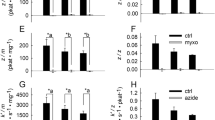Abstract
Signalling pathways such as ERK1/2, p38 or PI3K are activated in tumour cells by extracellular acidosis, which is a common phenomenon in human tumours. These signalling pathways can modulate the mitochondrial function and activity. The aim of the study was to evaluate the impact of extracellular acidosis on the mitochondrial O2 consumption and, in consequence, the potential role of ERK1/2, p38 and PI3K cascades on modulating the respiratory function. The O2 consumption rate (OCR) was measured at pH 7.4 and extracellular acidosis (pH 6.6) in combination with inhibition of the respective signalling pathway. The activity of the pathways was determined by phosphorylation-specific western blot using the cytosolic and mitochondrial fraction of cell lysates. The experiments were performed on a rat tumour cell line (subline AT1 of the rat R-3327 prostate carcinoma) and normal cells (NRK-49F fibroblasts). Acidosis increased the OCR of AT1 cells, especially the basal OCR and the O2 consumption, which is related to ATP production. In normal NRKF cells OCR was unaffected by low pH. Inhibition of ERK1/2 and PI3K, but not p38, reduced the acidosis-induced increase of the OCR significantly in AT1 tumour cells. In this cell line acidosis also led to an ERK1/2 and PI3K activation, predominantly in the mitochondrial fraction. These results indicate that extracellular acidosis activates cellular respiration in tumour cells, presumably by activating the ERK1/2 and/or the PI3K signalling cascade. This activation of ERK1/2 and PI3K is located primarily in the mitochondrial compartment of the cells.
Access this chapter
Tax calculation will be finalised at checkout
Purchases are for personal use only
Similar content being viewed by others
References
Vander Heiden MG, Cantley LC, Thompson CB (2009) Understanding the Warburg effect: the metabolic requirements of cell proliferation. Science 324(5930):1029–1033
Hui L, Chen Y (2015) Tumor microenvironment: sanctuary of the devil. Cancer Lett 368(1):7–13
Riemann A et al (2011) Acidic environment leads to ROS-induced MAPK signaling in cancer cells. PLoS One 6(7):e22445
Davis RJ (2000) Signal transduction by the JNK group of MAP kinases. Cell 103(2):239–252
Rauschner M et al (2021) Impact of the acidic environment on gene expression and functional parameters of tumors in vitro and in vivo. J Exp Clin Cancer Res 40(1):1–14
Wortzel I, Seger R (2011) The ERK Cascade: distinct functions within various subcellular organelles. Genes Cancer 2(3):195–209
Trempolec N et al (2017) Induction of oxidative metabolism by the p38α/MK2 pathway. Sci Rep 7(1):11367
Rohlenova K, Neuzil J, Rohlena J (2016) The role of Her2 and other oncogenes of the PI3K/AKT pathway in mitochondria. Biol Chem 397(7):607–615
Monick MM et al (2008) Constitutive ERK MAPK activity regulates macrophage ATP production and mitochondrial integrity. J Immunol 180(11):7485–7496
Papa S et al (2012) The oxidative phosphorylation system in mammalian mitochondria. Adv Exp Med Biol 942:3–37
Ersahin T, Tuncbag N, Cetin-Atalay R (2015) The PI3K/AKT/mTOR interactive pathway. Mol BioSyst 11(7):1946–1954
Prieto J et al (2016) Early ERK1/2 activation promotes DRP1-dependent mitochondrial fission necessary for cell reprogramming. Nat Commun 7:11124
Acknowledgments
The study was supported by the Deutsche Forschungsgemeinschaft DFG (grant TH482/6-1).
Author information
Authors and Affiliations
Corresponding author
Editor information
Editors and Affiliations
Rights and permissions
Copyright information
© 2022 Springer Nature Switzerland AG
About this paper
Cite this paper
Degitz, C., Reime, S., Thews, O. (2022). Effect of Acidosis-Induced Signalling Pathways on Mitochondrial O2 Consumption of Tumour Cells. In: Scholkmann, F., LaManna, J., Wolf, U. (eds) Oxygen Transport to Tissue XLIII. Advances in Experimental Medicine and Biology, vol 1395. Springer, Cham. https://doi.org/10.1007/978-3-031-14190-4_38
Download citation
DOI: https://doi.org/10.1007/978-3-031-14190-4_38
Published:
Publisher Name: Springer, Cham
Print ISBN: 978-3-031-14189-8
Online ISBN: 978-3-031-14190-4
eBook Packages: Biomedical and Life SciencesBiomedical and Life Sciences (R0)




